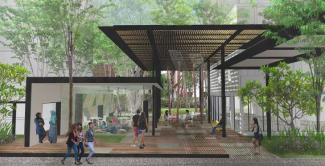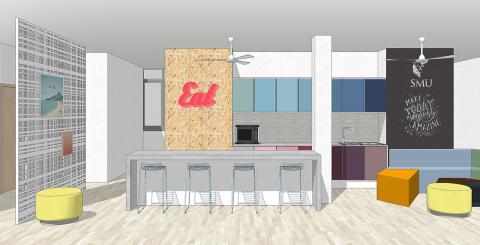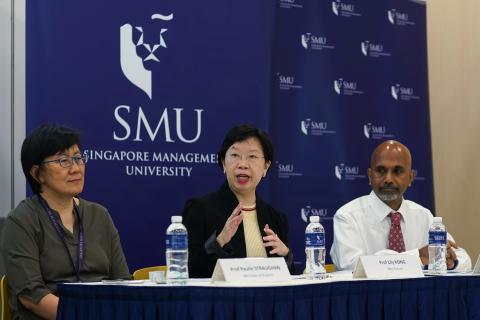
Singapore, 12 February 2018 (Monday) – In the new academic year (AY) 2018-2019 starting August this year, SMU will introduce a new residential learning-and-living concept at its existing student residence – Prinsep Street Residences (PSR). At PSR, SMU aims to build a community for the Community, where students co-live/work/learn together, and are also nurtured to be change agents by giving back to the Bras Basah community.
Staying true to SMU’s hallmark holistic approach to education, the University will offer programming guided by five themes – (i) Entrepreneurship, (ii) Social Entrepreneurship, (iii) Community Service, (iv) Grooming Future Leaders, and (v) Social Integration and Diversity. Through this thematic approach, PSR will provide a supportive environment that will nurture well-rounded students with strong esprit de corps, as they collaborate in projects and activities to make a meaningful impact in their immediate communities.

[Artist's impression of the PSR apartments' living and dining area—In line with the growing popularity of communal co-live/work/learn housing among millennials, PSR apartments offer generous living areas which open up opportunities for community meals, movie nights, birthday celebrations and other social networking opportunities.]
Professor Lily Kong, SMU Provost, said, “The SMU residential living-and-learning model is very much an extension of our holistic approach towards education, which has been a hallmark since SMU’s inception in 2000. As a university, we are committed to nurturing well-rounded students who will make a meaningful impact in their communities. We are confident that students will benefit richly from the residential experience, while contributing to the larger community around them.”
“SMU already offers a vibrant student life experience, with over 120 student clubs and an exciting co-curricular calendar throughout the year. PSR will be another platform through which students will have the opportunity to pursue an enriching, meaningful and unique residential experience in the heart of the city. Residential life will be enriched with academic curriculum as well as student-directed projects and activities. Through these learning opportunities between the community and the classroom, students will build character, develop life-skills and forge friendships for life,” Professor Kong added.

[Photo: (L-R) Prof Paulin Straughan, Prof Lily Kong and Mr Sundar Selvam sharing SMU's plans at a press briefing held on 12 February 2018.]
Refurbishment works are currently underway at the PSR estate, located about 650 metres (or 8 minutes by foot) from the SMU campus. When completed in July 2018, PSR will offer 23 large-sized shared apartments for 255 student residents, as well as purpose-built communal spaces that will facilitate and support co-living/working/learning. The PSR residential population will comprise undergraduates from across all four years of study, and a mix of Singaporean and international students.
In line with SMU’s commitment towards developing a smart, green and sustainable campus, several new technology and green features are being integrated with innovative smart building technology, so as to enhance energy efficiency and human comfort. The efforts are expected to bring about significant energy savings of approximately 45-50 per cent per year.
SMU’s care for the environment goes further with conscious reuse and recycling efforts. For example, key infrastructure such as existing electrical power lines, plumbing and sanitary network were assessed to be in good condition and retained with minor enhancements, thus avoiding wastage and unnecessary rework. Also to be reused are the existing security network, CCTVs, fire alarm (robustness ensured), chairs and water dispensers. Some used wall-mounted fans are being retained while others will be redeployed to other parts of the SMU campus. The used air-conditioning split units were traded-in for reuse at other construction sites. Mattresses found to be in good condition were distributed to charitable organisations, while the remaining ones were repurposed in construction work, i.e. used to cushion the impact from the hacking works and to mitigate the noise arising from hacking works.
_________________________________________
Media Contact
HUANG Peiling (Ms)
Senior Assistant Director, Corporate Communications
SMU Office of Corporate Communications & Marketing
(65) 6828 0964 / (65) 9845 3361 / plhuang [at] smu.edu.sg (plhuang[at]smu[dot]edu[dot]sg)